Zgiedhjet 2014/ Katastrofe - Elections 2014/Catastrophe
Last weekend we decided to stay in Kosovo, mainly because of the elections, but also because of a potential CLARD event. But thank goodness we did! So many things happened this past weekend, and I don't think I will ever have another chance to experience the confounding whirlwind of Kosovar politics again.
On Saturday I met Arbana and Anton at the office around 12pm. One of the ministries in Prishtina was sponsoring a "lawyers week" and hosted different events during the week. Saturday was designated legal aid/legal advice day so CLARD was out in full force with all of our pamphlets. I was given a shirt that said, "protect your rights!" in Albanian, which made me feel pretty official.

We joined a white tent on Mother Theresa street and for the next thirty minutes everything descended into pure chaos as the ministry coordinator was not pleased with the set up and kept shuffling around the different tables. But after everything was settled, the barristers donned their robes, and CLARD (along with OSCE) arranged their pamphlets and the event commenced. Over the next two hours I watched as the media stopped by and took pictures as well as several curious tourists. The best part was that the event actually worked! Beneficiaries, as well as random city people on the street, came up to the CLARD and OSCE tables seeking information and walking away with several different pamphlets on how to protect your rights and access the legal system within the city.

I'm starting to get the feeling that private lawyers are not a prevalent force within Kosovo. It seems that if you work within EULEX or a legal aid office that you have a pretty prominent role within the country, mainly helping the indigent citiznes. But the lawyers in the middle, the "private" lawyers, with their little offices around the city centers seem to be missing a necessary component. If I had to hypothesize I would think it's because the citizens that would use private lawyers, the ones that do not qualify for for legal aid and haven't been dragged into the court involuntary, have decided that the money that could be spent taking a case to court is better spent on daily needs. I other words, these people do not feel their legal problems at such a severe level as the other citizenry. Or in even better legal terms- the cost benefit analysis of taking a case to court is not supported by the input/output ratios. The cost of court filing fees and the average time waiting for a decision to be rendered takes too long.
After the lawyers week event, Abby and I went to pick up some food. After mulling over our options we decided to be adventurous and try the Thai food restaurant. It had come recommended and it just sounded amazing. Probably the best decision we made that weekend, it was so good! Below is the picture of the mild chicken curry dish I ordered.

On Sunday I was given the opportunity to work with D4D and observe the election process. I was unsure on what to expect, but it turned out to be one of the more interesting experiences of my life. The majority of the interns wanted to go north to the Mitrovica area to observe what elections would be like in such a volatile environment. But Leon, the head of D4D, explained that election day in Mitrovica would probably be the safest day to visit the city. Police, KFOR, and any other armed military force were going to be out in full force observing for the entire day.
Just a little background on these elections, because things are quite different from the American system. People will have to forgive me if there is gaping holes in this explanation- I have been piecing together information about this event ever since we arrived. But if I misrepresent anything just know that it was probably due to me not understanding versus the person informing me of the wrong facts. From what I can tell, elections in Kosovo normally take place in November. Which was the first red flag that I saw with the entire process, election day is not suppose to move. But that's a product of growing up with a strictly enforced election system in America. I am pretty sure if we ever tried to move elections in America the entire society would explode with accusations of communism or dictatorship levied against whatever party was in power. But, nevertheless, Kosovo decided to hold their elections in June. There are two explanations given for this (1) that the Serbian minority members blocked a proposal for an active army within Kosovo and (2) that the party currently in charge (PDK) recognized that they were losing popular support and wanted to push up elections to cushion their loss in polls. Either way it is apparently a constitutional mechanism to push forward elections as long as other parties within the current Assembly agree to it, which they did. So they basically dissolved the Assembly early and stopped all active work to focus on elections. (Below are three major party campaign posters)
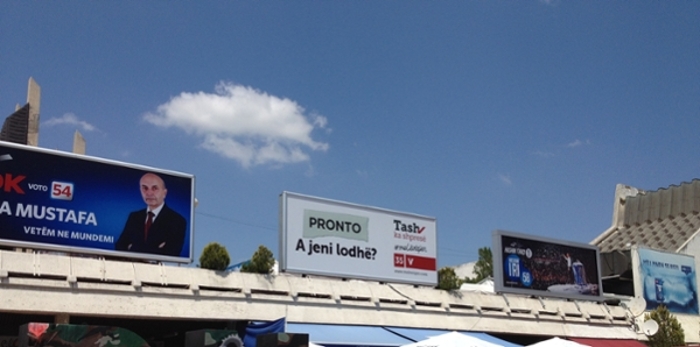
Being in a different country during their election process is very interesting. There are a lot of rumors and ideas floating around Kosovo at any given time, but during the last week things intensified. One of the things mentioned during the round tables that I attended was that people with physical disabilities are largely procedurally ignored through different societal environments. i.e. if you are in a wheelchair you will have a very hard time finding a ramp or elevator to ease your way around town. So, while I was the gym working out I noticed that certain political campaigns were running commercials which included a little side box with a person using sign language. My immediate thought was "clever", what better way to show that your party is involved with real criticisms of the infrastructure then by addressing people through sign language. Even if a person suffering from physical disabilities did not need sign language they would still carry sense that the party advertising was looking out for the minority groups of the population. My second thought was "well that's dirty", because I would think that it is easy to find a sign language expert for your commercials. But it may be pretty hard to push through building code changes to help people within the city. Just another reason that I am not a political advisor. The other rumor/idea that I consistently hear is that the U.S. ambassador is actually running the entire governmental show in Kosovo. That she picks a name and puts it into an envelope and that is who is elected. I try to dissuade that rumor as much as possible, but then again Kosovars have been working alongside international help ever since the UN resolution. So they probably have a better idea of the true reality then I do.
Anton and Nerad both told me that the leading party prime minister had hired an American political advisor - and that you could see the impact in the way the prime minister was acting. Last elections he was a solo campaigner (sans wife and family) and always fully suited up. But this time around he's was out in the streets taking selfies with people and walking around in business casual whenever appearing in public. His wife has also appeared at several events and the entire image has came off as a "man of the people". People have even started to compare him to George Clooney. Which I am here to tell you that he does not look like Mr. Clooney. See the picture below and decide for yourself.

I have never felt more self aware of our political brain washing then watching these Kosovo elections. Anyways, back to the Sunday events. Since I have not been accredited by the Kosovo government I was technically not allowed to be observing within the actual polling stations. But through a weird loophole, and probably by just looking like a confused American, I managed to be in some of the hallways in the different polling stations. That is one of the similarities in both countries, you vote in schools. The first school must have been elementary grade because their was a lot of artwork on the walls. I even spotted the Statue of Liberty in one.
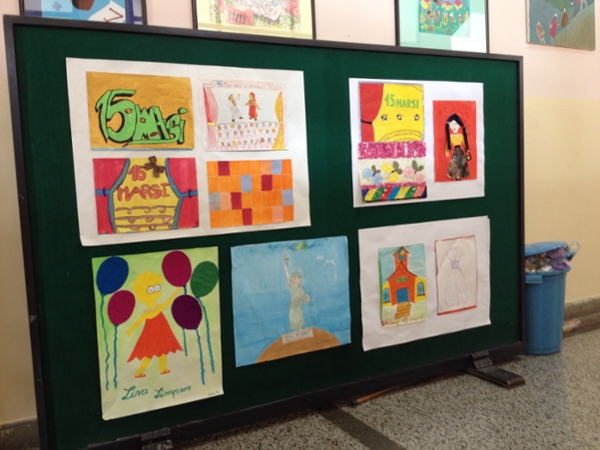
We were suppose to be on the lookout for suspicious activity. When I asked what that exactly entailed they looked at me like I was crazy! But in my defense I had no idea that they had such problems last elections. Apparently the last time around there was ballot stuffing, selling of votes outside polling stations, and in general just random violations of election law. So after that was explained I tried my best to keep a wary eye out for election violations. One of the security measures that the government has taken with the voting process is the use of a black light to scan people's hands. When you vote in Kosovo you also fingerprint the document with a special ink, and it's one of the ways that they keep people from voting multiple times. The security guards at the polling stations check your hands for ink before you can enter. Unfortunately, the D4D member's ink was not showing up under the black light! So it might not be the most effective security measure.

Since D4D was graciously allowing me to tag along on the election journey I ended up trailing around with the man assigned to Prishtina coverage. He served a dual function of keeping an eye on Prishtina activities and fielding calls from everyone else that was spread across the countryside. We started the day out with him visiting a school to vote and then we moved to a NGOs headquarters that were specifically monitoring suspicious activity in the field. They had something around 2,000 volunteers wearing yellow shirts and reporting in to the main call center every hour. While at the headquarters I watched a press conference, which was the closest I have ever been to a person giving an official statement. At that point nothing had been reported and I was hoping that this time around the elections would be a smooth process.

We moved to cafe after the press conference to the D4D member could check the internet and see if any press were reporting problems. He also explained that there was a general rule that every person should be within 3 km walking distance to a polling station. The measure is suppose to be in place to protect everyone's right to vote. Unfortunately, I don't think that it has been regularly enforced, but it is a good thought. We then went to an official press conference held by the election committee of Kosovo. The main woman who was in charge of the committee was an elected judicial figure and gave a concise statement in Albanian and then proceeded to field all media questions. At one point about 80% of the committee had to use the translation services available because a Serbian reporter was there asking for pertinent information concerning the different voter turnout in the Serbian enclaves.
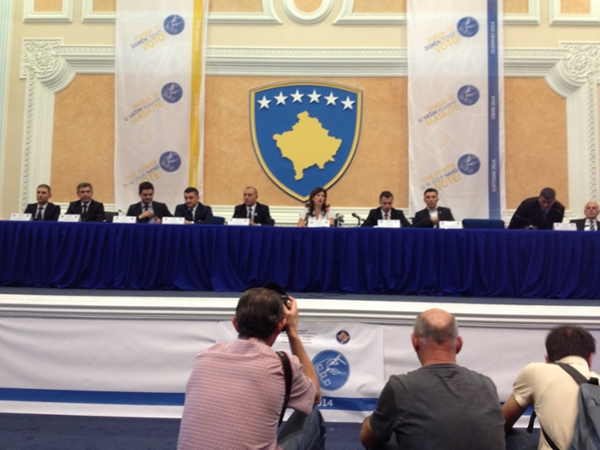
After the press conference the D4D member talked to the majority of the panel and even managed to snag one of the official spreadsheets on voter turnout! Later that night, I one of the committee members that I had spoke with appeared on TV in an interview concerning election violations. We then went to pick up lunch at a traditional "fast food" place and then headed to the TV station. During our walk to the TV station the D4D member told me that they had forecasted a large turnout for these elections. Unfortunately, at that point only 20% of the population had voted. Election stations are open from 7am-7pm and are held on Sundays so D4D was hoping for a late afternoon surge in the numbers. I think that Europeans believe that a wide time frame and hosting elections on weekends will foster a bigger turnout.
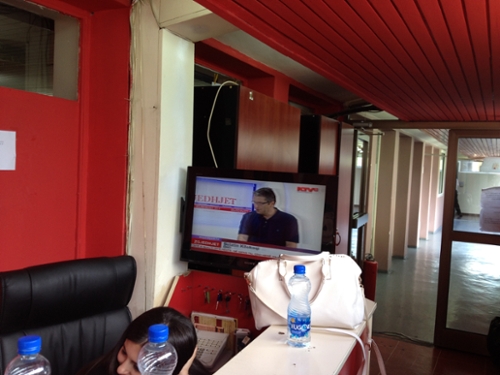
I ended up leaving after the TV interview because of a CLARD assignment that was due on Tuesday. But I kept an eye on the results and broadcasted news. Somewhere around 9pm that night the former party in charge, PDK, announced their re-election victory. I had been warned previously that a bunch of the parties always claim victory before the official results are reported. Probably because it takes about a week for the "official" numbers come out. But whomever told me that forgot to tell the city of Prishtina to not preemptively celebrate, because that night the streets were a explosion of noise and fireworks. We could hear chanting of "P-D-K" through the wee hours of the morning. Foreign media reported on the elections in Kosovo and I was shocked to find that their perception (in my opinion) was way off base with what was actually going on. Because Kosovo had been granted application status to the EU the majority of the foreign media was focusing on the Serbian-Albanian relations. The EU had told Kosovo that they needed to demonstrate that minority groups had a strong voice within the country and one way of measuring this was to track the Serbian voter turn out. But, the giant hiccup here, is that the Serbian population is granted a minimum of ten seats in the Assembly regardless of their voter turn out. So there is no incentive for Serbians to come out and vote, therefore this is a terrible standard to be measuring inter ethnic relations. If the country had wanted to see better voter turn out I feel that they should have focused on their younger generations and really put in an effort to motivate them to vote. But that did not happen and the voter turn out fell very short of the 80% that D4D was hoping for. Also, after PDK claimed victory our friend, Ida, was asked to come to a TV station as a foreign analyst and give live commentary on the results!

On Monday after the elections the office environment was a little depressed. Anton expressed that he was very sad because of the rampant corruption that PDK allegedly brought with them. Also, “katastrofe” was dropped a lot. Katastrofe is a favorite term in the CLARD office and it literally means what you think it does, catastrophe. So people run around and talk in excited tones, and then a couple of minutes in (more often than not) will drop “katastrofe!” I secretly adore it. It seems to be the epitome of the Kosovar culture.
Amidst all of the political fall out I finished my second memo involving the EU standard involving a Letter of Rights. A Letter of Rights stems from the Stockholm Program of the EU and is suppose to foster the right to information in criminal proceedings. Right now, the Kosovo Police are aware of the standard but refuse to implement it. It was an interesting memo to write, and really reflected the contrast between the EU system and the one we have in America.
Also, as a side note, one of the power plants (Power Plant "A") that supports Kosovo's entire electricity infrastructure had a hydrogen tank explode killing several people. The EU has listed one of the requirements of Kosovo joining the union to be the shut down of this power plant. But they have never fostered options on what Kosovo should do to replace their main power generator. The media also plunged everyone into a wide spread panic over the possibilities of black outs. Which may or less come true, we have experienced black outs and I have never been so righteously angry over all of my lost research. The last blackout we waited for 20 minutes in hope that the electricity would come back on. We eventually gave up and went over to Gagi cafe for coffee. Tuesday morning I turned in my final PDF draft of my memo and then traveled with Arbana to Gilan to take part in another round table aimed at the discussion of access to justice.
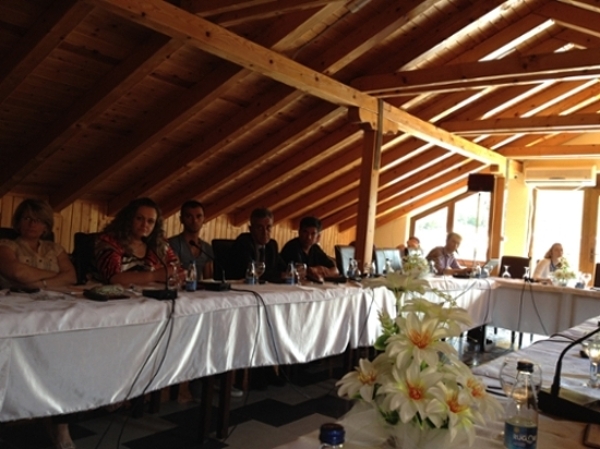
This round table actually produced a very telling thought process. A master student proposed that Kosovars understand their rights, but the moment that they are confronted with a situation that violates those rights they no longer know how to protect them or where to go to seek help. I thought it was interesting because it seemed much more in line with the information coming out of the round tables. People have demonstrated knowledge of their basic human rights, the problem seems to be that they don’t know what to do with them once they are violated. Also the sentiment has been expressed that human rights are only as good as the law that enforces them. The idea that the law is unable to implement their own decisions is a re-occuring theme in the round tables and speaks to the lack of trust in the judicial system as a whole. One person even mentioned that we should just overhaul the entire system and kick out all the current judges!
When Arbana and I arrived back in Prishtina we found the office in an uproar.

From what I can tell, and what Anton has explained to me, the political groups opposed to PDK have formed a coalition and are threatening to impeach the man that has been claiming to have been “re-elected”. As Anton has taken the time to painstakingly run me through the system I will try and explain the best I can. Kosovo holds popular vote elections for the Assembly seats. The Assembly is the highest power in the land. Whatever party takes majority in the Assembly nominates a president and then president is voted on within the Assembly. Still unsure on how the Prime Minister is elected, I think that might be through the majority party as well. The groups in opposition have announced that they are trying to impeach the prime minister. But the point is that without an election of a president the Assembly is not a functioning body and cannot be threatening or doing anything. Not to mention that we are still waiting for the official numbers to come out!
The popular sentiment on the streets is that the prime minister is in trouble but no one exactly knows how the opposition should proceed. If they stay in a standstill for too long, 60 days, re-election has to take place and the whole system starts over. Anton thinks that is the best course of action. But I am still boggled over the fact that you can just impeach someone on the thought that the other parties don’t like you. Anyways, LDK is really excited about the prospect of impeaching the PDK prime minister and last night they were riding around the streets in fine spirits.
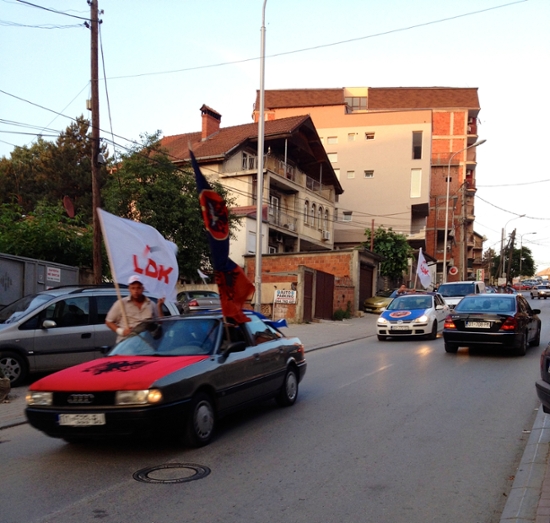
Not to mention the raging debates that are taking place within the office over the constitutionality of such a radical move. Arbana and Nezad were taking turns looking up constitution provisions and reading them out loud to the entire office (of course it was all in Albanian).
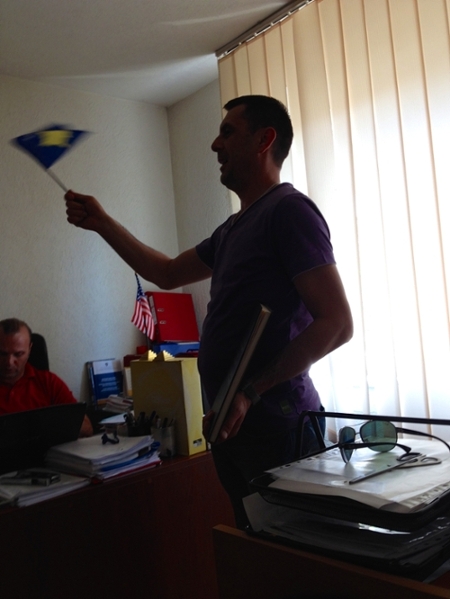
Just goes to show that lawyers are the same across the world. We like to look up laws and debate both sides vigorously against our colleagues!